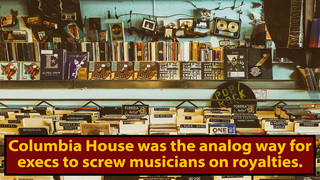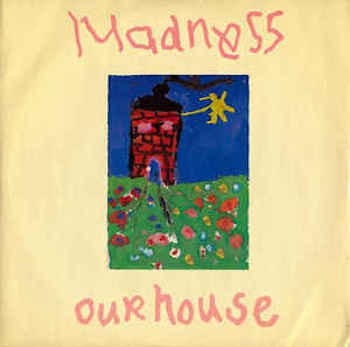A Shady Mailing Service Was Pre-Internet Spotify

With the exception of those who can only achieve orgasm while holding vinyl, nobody wants to go back to the days of physical albums when all you could listen to was the radio and your three Aqua singles. If you wanted more, you'd have to go buy music in a music store like some sort of animal. But whenever you're tweaking your ad blocker to get rid of those pesky Spotify breaks or tricking iTunes into accepting torrented Post Malone albums, do give a thought to those physical pioneers who created every shitty internet music practice before there was even an internet to speak of.
From the '70s until the '90s, Columbia House, a subsidiary of Columbia Records, was the major distributor of music to the young and cheap via its mail-order albums. Like musical meth dealers, the first taste was as good as free. Signing up to Columbia House could get you eight CDs for the low low price of a single cent, an enticing offer for their mainly piggybank-rich demographic. Oh, for Gen Z readers: a CD is a physical disk that typically stored a single album's worth of music.

But Columbia House was only a noble sounding organization. The company made its millions abusing a practice popular by contemporary online subscription services called negative option billing, i.e., people forgetting to cancel their subscriptions before the price gouging would start. On the other end, Columbia House employed teams of sharks whose only task was getting publishers to sign loophole royalty deals that allowed CH to continue to offer more music for pennies on the dollar. And like many modern music platforms, pennies were all the artists could expect to see for their hard work.
Of course, with that kind of predatory practices, it came with its own, then unique form of music piracy: the endlessly free trial-shuffle. Cash strapped kids would order a ton of CDs, often using fake identities. When the package arrived, they'd steam them open, quickly copy the music on their computer/tape deck and then hand them back to the mailwoman with a "return to sender" scrawled on the back as if the exchange never happened. One refund later and they'd do it all over again until every single Dave Matthews Band single was in their possession.
But between the, let's say, torrent of returns and the eventual convenience of both MP3s and the likes of Limewire and Napster allowing teens to no longer have to chap their lips re-sealing packages, Columbia House went into decline. In 2009, the music stopped. Literally, they stopped sending music and instead focused on the booming business of movie rentals, thus putting the final nail in the coffin of both Columbia and of parents yelling at their kids for accidentally spending 50 bucks on shitty Metallica albums.
For more weird tangents and predatory practices, do follow Cedric on Twitter.
Top Image: Mick Haupt, Unsplash